
Benefit from All the Advantages of Cloud Computing Thanks to a Customized Cloud
The cloud must fit to the company - and not the other way around
The number of cloud providers is unmanageably large: from global conglomerates to specialized niche cloud service providers. There are also a wide variety of cloud scenarios - private, public, hybrid, and multi-cloud. What aspects should companies use to make their decision?
Public versus Private Cloud
There are two basic types of cloud: the public cloud and the private cloud. Several companies, institutions, or even end-users access the same hardware in the public cloud. Well-known examples of this are streaming platforms or Internet marketplaces in contrast to the private cloud, whose infrastructure is exclusively available to the company, virtually as its own virtual data center. In addition to these two variants, there are also hybrid clouds and multi-clouds.
Features of the public cloud
The public cloud is characterized by very high flexibility, user-friendly handling, and immense scalability. Booked services can be increased or reduced relatively easily and quickly depending on requirements. In addition, moving to the public cloud is remarkably straightforward. On the one hand, because it is ready for use immediately. And on the other hand, because the most frequently used services are available as self-services by default, adjustments are generally not necessary. With good utilization and many users, the cloud providers also offer an excellent price-performance ratio. What's more, with the pay-by-use model, the customer only pays for the infrastructure used - instead of a monthly or annual flat rate.
Disadvantages of the public cloud:
- The customer is limited to the portfolio of his provider.
- Switching to another provider is enormously time-consuming and not infrequently associated with data loss.
- It is not always obvious where the provider stores the data and the status of data protection and IT security.
- The applications are standardized and can usually not be adapted to customer-specific requirements or only with a great deal of effort.
Features of the private cloud
If the data is located in Germany or the EU, then the private cloud scores with maximum data security. The individual components, functions and services are also precisely tailored to the specific needs of the company, resulting in high efficiency and user-friendliness. This also makes it easier to implement the company's own IT governance and compliance requirements. Another plus is the unrestricted availability of the infrastructure, because only the company itself accesses it - and no third parties. In addition, the company receives individual customer support and advice.
On the flip side of the coin, there are usually higher deployment and additional customization costs, less scalability, and less flexibility.
Companies with very strict security and compliance requirements or the need to determine and control the way their data is handled to the greatest possible extent should opt for the private cloud. Moreover, it is particularly suitable for static and IT infrastructures.
But the various cloud forms are not the end of the story. Clouds also differ in terms of their content:
- If a company no longer hosts its software in the local data center but obtains it from the ready-installed cloud, this is Software-as-a-Service (SaaS).
- If the provider provides a kind of marketplace in a platform to which the company docks, it uses Platform-as-a-Service (PaaS).
- If the company obtains all its IT services from the cloud, it uses Infrastructure-as-a-Service (IaaS).
This includes, for example:
- Servers and databases
- All software applications, including enterprise software such as SAP
- Virtual desktops
Services such as Netflix or Spotify also ultimately act as specialized cloud providers - for streaming movies and audio formats, respectively.
The Challenge in Business
It is hard to imagine a private environment without cloud services. Just think of YouTube, Deezer, Google Photos or Amazon, some of which are also used in a commercial context. But when it comes to the systematic use of cloud offerings in companies, the situation is more complicated. On the one hand, because a large number of people with very different backgrounds usually use the services. On the other hand, because different applications are usually used in a company - for example, an ERP system in controlling and management, a CRM solution in marketing and sales, and an enterprise resource planning system in production and purchasing. Not to be forgotten: All employees must be able to access applications that are relevant to them - regardless of their location and across all end devices.
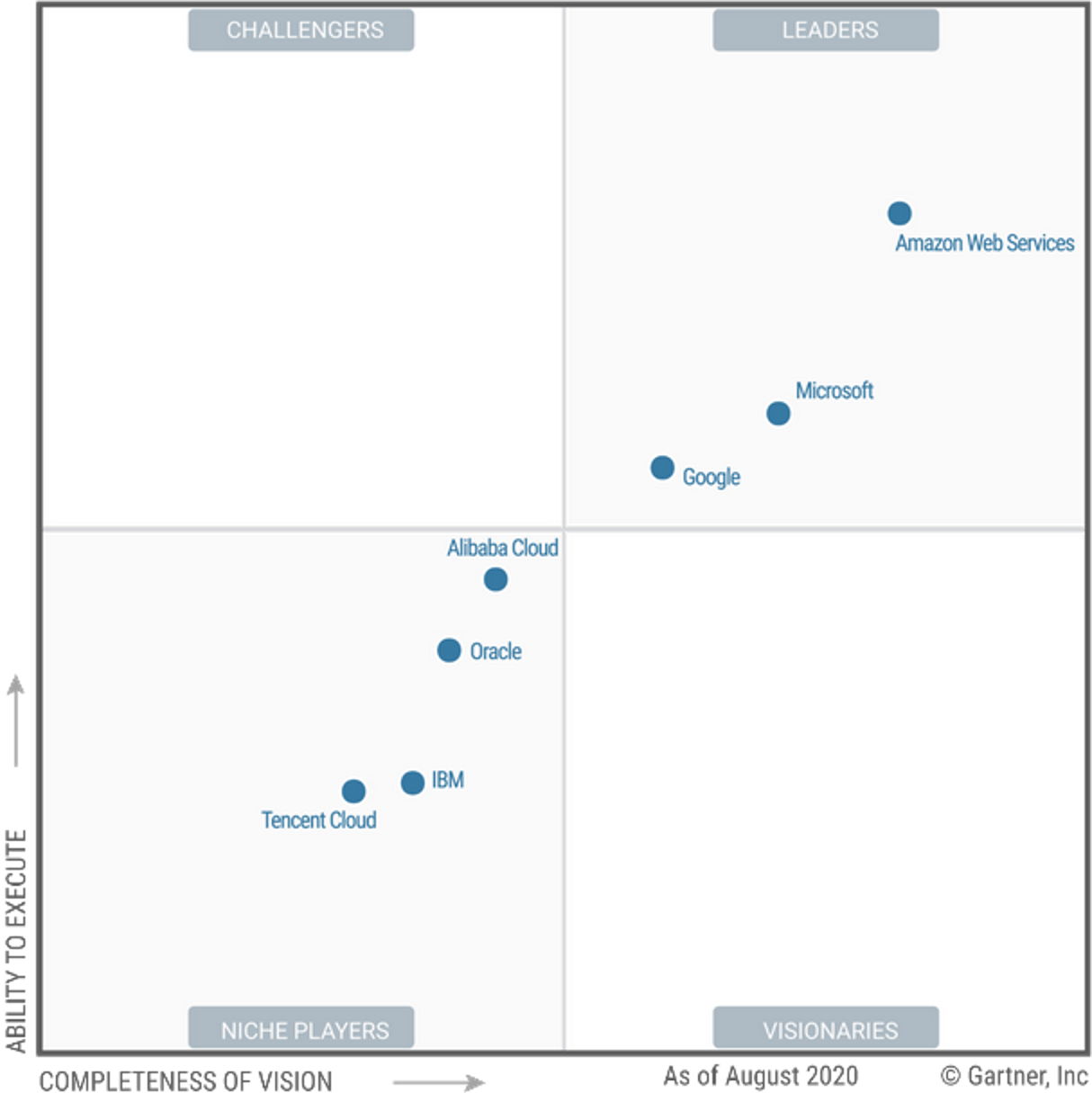
The Big Three
The market for cloud services has grown rapidly in recent years, as a comparison of platform and share indices clearly demonstrates. The platform index, for example, has more than quadrupled from 1,000 in 2016 to currently over 4,000.
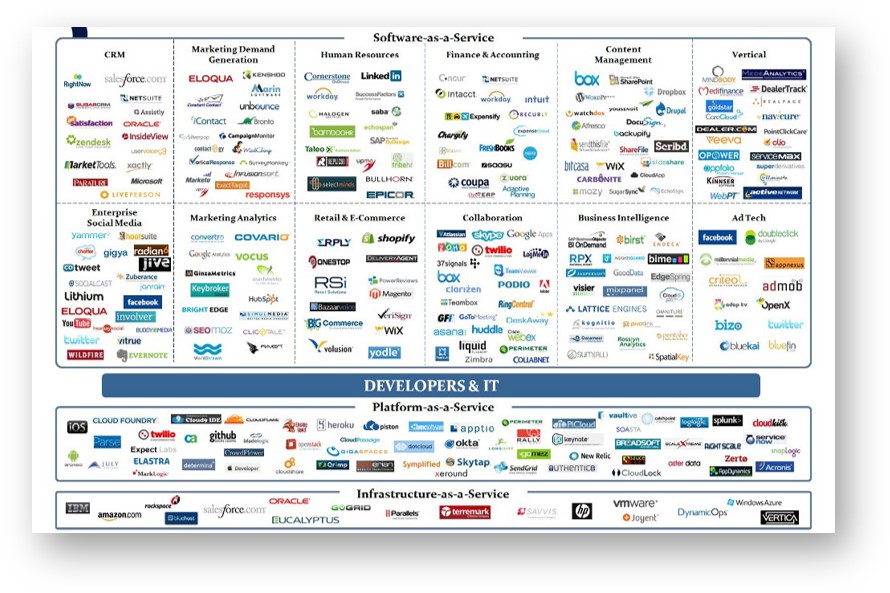
The growth will continue or even accelerate, according to the experts' forecast. Not surprisingly, many companies want to profit from the expected development and offer their services. There are now thousands of them.
The dominant global players, also known as hyperscalers, are undoubtedly:
- Amazon Web Services (AWS)
- Microsoft Azure
- Google Cloud
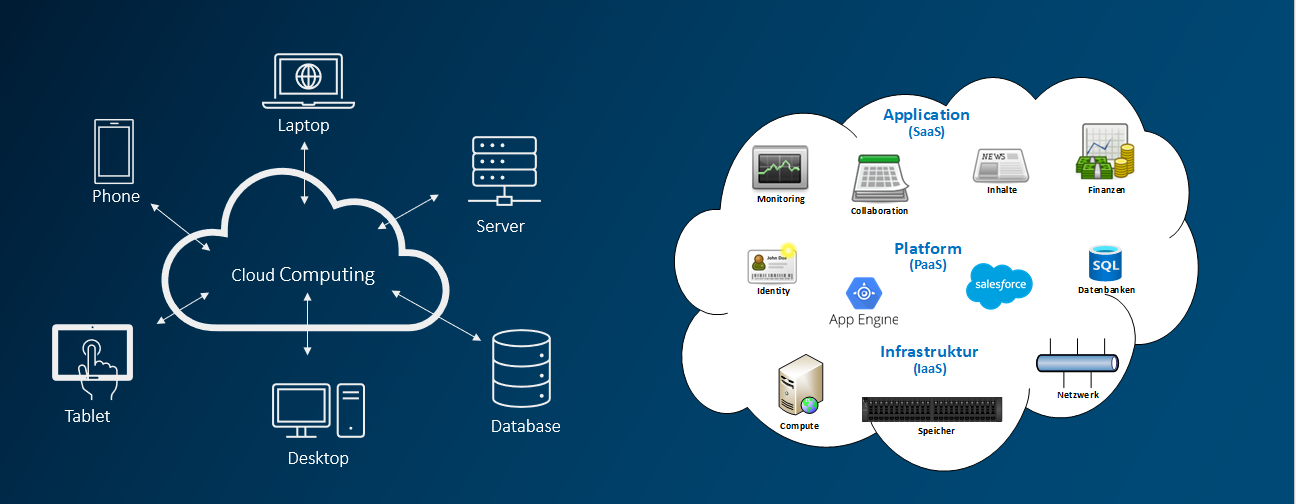
Amazon Web Services
Amazon launched cloud services on the market at a very early stage and was therefore able to gather the most experience. In the areas of IaaS and PaaS, the industry leader is the undisputed number one. AWS currently has the largest ISV ecosystem and works with over 2,000 consulting partners.
An ISV - Independent Software Vendor - is a software company that develops and sells its own applications independently of other software manufacturers.
Microsoft Azure
MS Azure is currently growing the fastest. One reason for this is probably the high level of familiarity with Outlook. One advantage for users is the close integration into the Microsoft universe, especially MS Office. Customers also benefit from hybrid scenarios of on- and off-premises systems.
Google Cloud
The US company is the international market leader for Container-as-a-Service. Its portfolio also includes well-implemented, reliable and high-performance IaaS and PaaS services. Google has also invested heavily in future technologies such as analytics and machine learning.
The trend is moving more and more in the direction of container solutions. Applications are no longer installed on a standard server with an operating system, but in so-called (Docker) containers. The most widely used type of container is Kubernetes. It was originally developed by Google Cloud and has existed as an open source solution since 2004.
The Hybrid IT Architecture
Many companies host their entire system landscape with just one provider. The advantages of this are lower costs and significantly less effort. With a multi-cloud strategy, on the other hand, the company uses several cloud providers. In this way, it can reduce the risk of a failure or a data breach, because only one area and not the entire company would be affected. Even more importantly, this approach allows the company to choose the right cloud for each area or workload to be outsourced, depending on the technical requirements of the application, its protection needs or financial aspects. If both cloud forms - public and private cloud - are used, this is known as a hybrid cloud or hybrid IT landscape.
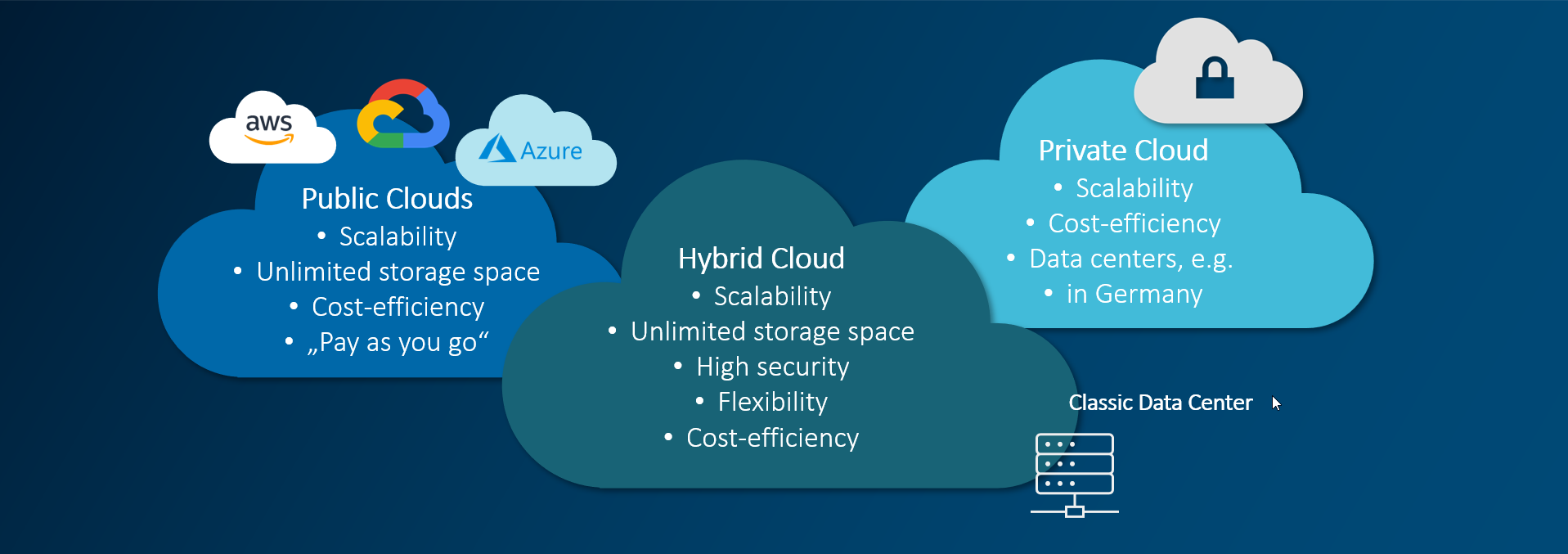
In the case of the hybrid cloud, it makes sense to process sensitive or critical data in the private cloud. It is also feasible to combine cloud and on-premises infrastructure and thus combine the advantages of both worlds, such as the particularly high data protection in the on-site data center with the flexibility and scalability of a public cloud server.
However, it should be noted that the implementation and operational management of a multi-cloud strategy require additional administrative effort. This is all the greater, the more cloud providers are involved. In any case, it is crucial that all systems form a single unit and are seamlessly interconnected. In the event of a technical problem, it is also possible that the service providers will pass the buck to each other. Not to be forgotten: A concept must first be developed that defines which services are required for which areas and/or workloads, and - in the next step - which provider has the best offer for each.
With a multi-cloud provider as a service partner, companies bypass the additional administrative effort of the multi- or hybrid cloud without having to forego its advantages. They have only one contractual partner who takes care of everything:
- the dovetailing of cloud services,
- the smooth running of the processes,
- the commercial processing with various partners,
- troubleshooting or the implementation of changes, and
- adherence to compliance, budget and security requirements.
Choosing the Right Multi-Cloud Service Provider
The biggest challenge is usually to dovetail the services from the cloud optimally with the company's IT architecture. The provider should therefore have extensive expertise in full IT outsourcing and appropriate references. It has proven effective to manage the resources of the hybrid cloud via a portal. Many processes should be automated as far as possible. This relieves the provider of routine tasks and allows it to concentrate on consulting services and customer support. In addition, automated processes are less prone to errors than manual ones.
A portal allows companies to manage parts of their cloud solution themselves. For example, to increase the value added in-house.
Conclusion
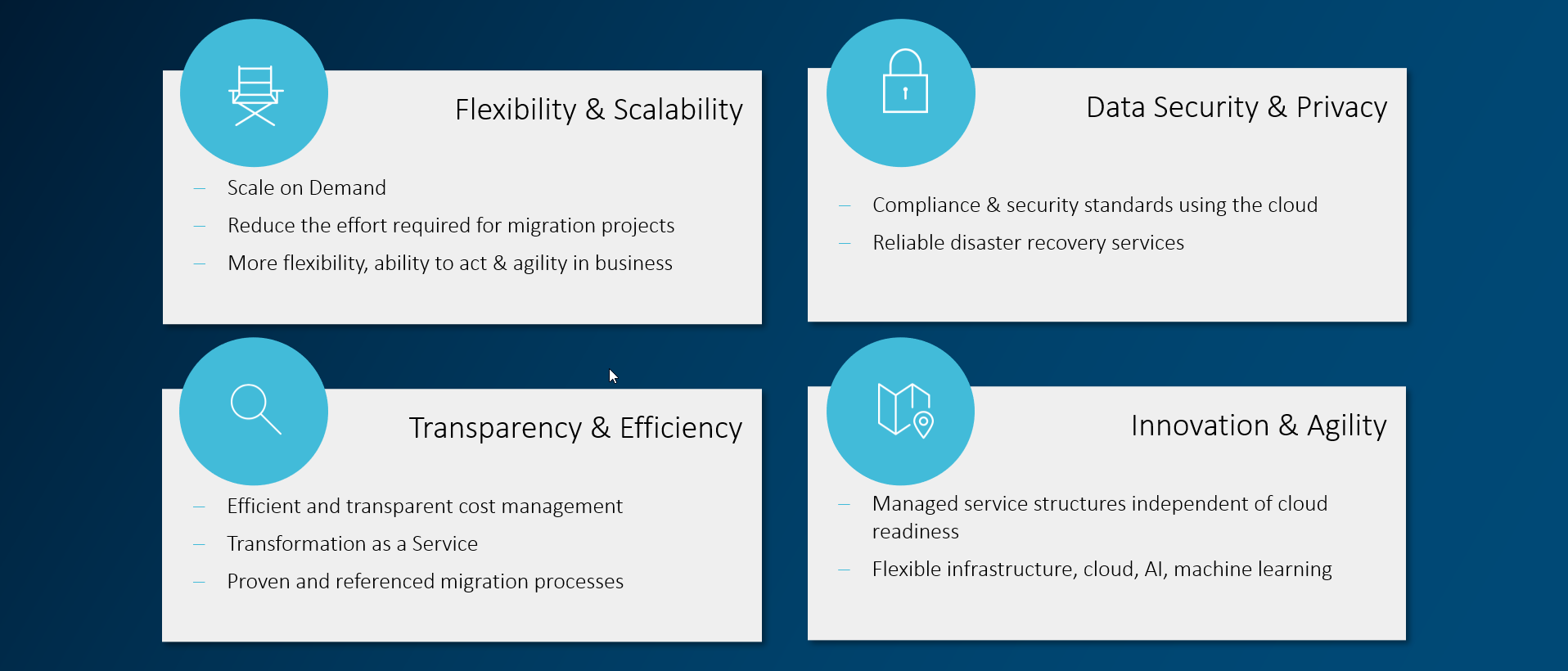
Companies obtain cloud services tailored to their needs thanks to the hybrid cloud. A reliable multi-cloud provider relieves them of additional work.
Learn more about developing and implementing a multi-cloud strategy that is optimal for your company here.
Written by






